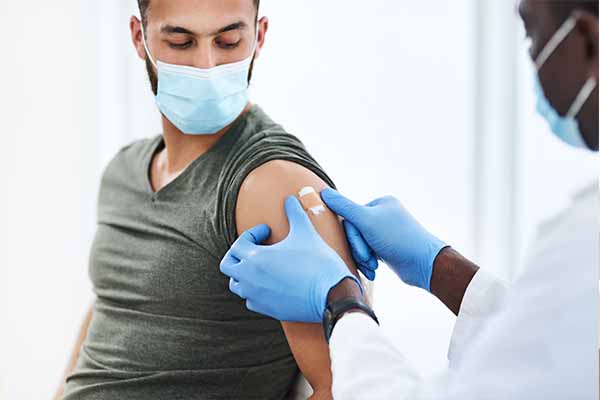
This year’s respiratory illness season is likely to bring a similar or lower number of combined peak hospitalizations due to COVID-19, influenza, and respiratory syncytial virus (RSV) compared with last season, the Centers for Disease Control and Prevention (CDC) telegraphed in its 2024-25 Respiratory Disease Season Outlook.
The CDC forecast, along with recent updates to the agency’s vaccine guidance, aligns with the expectations of JB Cantey, MD, a member of TMA’s Committee on Infectious Diseases and associate professor of pediatrics at the UT Health San Antonio Long School of Medicine in the division of pediatric immunology and infectious diseases. He foresees a potentially lower peak this season following the backlog of respiratory infections that recently affected 2-, 3-, and 4-year-olds.
With a significant chunk of the population masking in 2020 and 2021, Dr. Cantey notes, those children were exposed for the first time in 2022 and 2023 to respiratory pathogens that they normally would have encountered earlier in life.
“The hope would be, this year, that some of that immunologic debt has been paid,” Dr. Cantey said. He cites vaccines for COVID and flu as additional reasons for the possibly brighter outlook, as well as now-widely available RSV vaccines for pregnant women and older patients, and broader availability of nirsevimab, a monoclonal antibody immunization for infants and young children.
Unlike last season’s shortages of nirsevimab, CDC’s Advisory Committee on Immunization Practices forecasts an ample supply of the treatment this season. Pediatric immunization with nirsevimab is recommended for:
- Infants under 8 months who are in their first RSV season and whose mother did not receive the RSV vaccine (or maternal immunization status is unknown) or whose birth occurred less than 14 days after the maternal immunization date; and
- Children aged 8-19 months who are at increased risk for severe RSV disease due to existing conditions or if insufficient immune response is expected.
CDC also refined its RSV guidance for adults 60 and older, recommending a single dose of RSV vaccine for adults 75 and older and adults 60-74 who are at increased risk. After immunization, no additional RSV vaccine shots or booster doses are needed for those populations. That clarification comes after reviewing the effects of last season’s first-time guidance recommending RSV vaccination for all adults 60 and older.
RSV activity across the state has begun, in accordance with the virus’s traditional seasonal pattern emerging around Oct. 1, Dr. Cantey says. “And obviously COVID continues to kind of smolder along.”
CDC recommends COVID-19 vaccination for everyone ages 6 months and older in the U.S. Adults 65 and older and patients who are moderately or severely immunocompromised are recommended to receive a second dose of 2024-2025 COVID-19 vaccine six months after their first dose.
For those recently been immunized with the 2023-24 COVID-19 vaccine, CDC recommends a minimum two-month interval before administration of the 2024-25 vaccine, and people who recently had COVID-19 can delay receiving the vaccine for three months.
CDC issued no changes to its flu guidance, recommending vaccination for everyone aged 6 months and older, with rare exceptions. For people 65 and older, three higher-dose or adjuvanted vaccines are preferentially recommended over standard-dose vaccines.
For a look at respiratory disease activity in a specific geographic area, physicians can consult the Texas Department of State Health Services (DSHS) Respiratory Virus Surveillance Report, which is updated weekly and includes:
- Regional activity reports for flu;
- The number and percentage of positive antigen and polymerase chain reaction (PCR) tests for RSV.
Dr. Cantey relies heavily on DSHS respiratory surveillance data to track flu, RSV, and COVID trends and reiterates the benefit of vaccines.
“Hopefully we won’t see the inpatient bed crunch that we saw last year, but if we do, obviously the state and local health departments will need to work with providers so that everyone kind of knows what’s available,” he said. “I’m hoping it doesn’t come to that because of all the tools we have available this year.”
Find patient education materials on vaccines, including fact sheets, graphics, and videos, in a digital toolkit on the Texas Medical Association’s Vaccines Defend What Matters campaign webpage.
Jessica Ridge
Reporter, Division of Communications and Marketing
(512) 370-1395